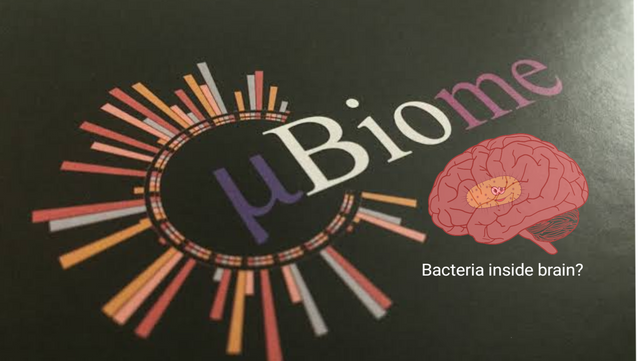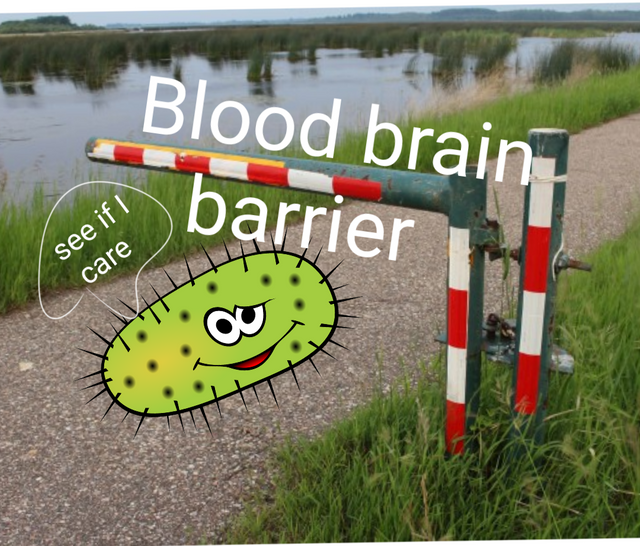Bacteria - it's in your head this time
In our body, they outnumber us by 10 cells for every 1 human cells. They live on our skin, in our gut, in our respiratory tract and our genitals but what the hell are they doing in our brain?

Adapted from microbiome by Tony Webster | CC by 2.0, brain by OpenClipart-Vectors | CC0, and bacterium by OpenClipart-Vectors | CC0.
We are surrounded by bacteria all around us - the air we breathe, water we drink, food we eat, floor we walk on and hell, even on screen you are reading this on. Hence, it is not surprising that they come in constant contact with open surfaces of the body. Only a very tiny proportion of all the bacteria we interact with makes us sick. A lot of them rather home on the open surfaces of body - skin, mouth, eyes, ear, penis, vagina, the gut and the respiratory tract. They never make us sick. In fact many of them rather live in a symbiotic relationship with us.
In a blog, I published earlier, I described that how they are in important in sickness and health. Altering the overall makeup of all the different bacteria that live in our gut - the gut microbiome - can lead to obesity and insulin resistance. In fact, I also mentioned the gut microbiome interacts with gene expression of cells in our body, including our neurons. The lipopolysaccharide (LPS) and other compunds that leak from the gut microbiome, interact with our brain. They can cause low grade inflammation in our body and in our hypothalamus for instance and cause us to over eat.
Are you bacteria in a face of a human?
If you dig a little further you will realize that these bacteria can even control our mood (Winter et al., 2018). They also control our mental health (Malan-Muller et al., 2018). They can predict our risk to anxiety disorder and depression. And, that's not all. Altering the gut microbiome has been proposed as a possible clinical intervention to treat schizophrenia and bipolar disorder (Dickerson et al., 2017). Though only clinical trials will tell us if it is effective. Moreover, there is also line of study exploring the possibility of microbiome as causative explanation for neurodegenerative diseases - such as Parkinson's and Alzheimer's disease (Marizzoni et al., 2017).
Given that the bacteria are affecting your health, influencing your behaviour and they out number you in terms of number of cells human vs bacterial cells in your body - have you ever thought that how much of you is human really? Well at least we would have found solace in the fact that these bacteria remain limited to exposed external surfaces. However, this notion was challenged by a recent poster presented by Roberts et al., at neuroscience 2018 conference by society for neuroscience, at Washington DC.
Can bacteria get into the brain?

Adapted from bacterium by OpenClipart-Vectors | CC0, and barrier by Kevin Casper | CC0.
The authors of the poster claimed that they have found strong evidence for bacteria inside the brain. But how can bacteria reach the brain? Well, it's not like it can't. Rabies virus reach the brain. Certain bacteria that invade the blood stream and cause bacterial menegitis
are also known to infect the brain. Even though brain is protected by a special filter called - blood-brain barrier that is very selective for what enters the brain through blood vessels - these bacteria seem to have evolved mechanisms to get past it (Coureuil et al., 2017). Yet another route that these bacteria can take is via nerves. Just like rabies virus many bacteria can enter the brain via retrograde transport in nerves (Drevets et al., 2004). So can some bacteria from the gut also manage to get into the brain of a perfectly normal humans? Well at least that's what Roberts et al., seem to claim.
Roberts et al., took the brain sections of 34 cadavers and did high resolution imaging. They identified rod shaped bacteria living within the cells of healthy brains. They found these bacteria to be living inside the glial cells, the astrocytes and even in axons of the neurons. What surprised me the most is presence of these bacteria not only in superficial but in deep brain structures such as hippocampus.
To find the origin of bacteria, these guys did RNA sequencing of brain samples. Well, because not only ribosomal RNA is can be distinguished between prokaryotic bacterium and eukaryotic hunan cells, but you can cluster the sequences you get to identify the different kinds of bacteria present. Turns out, the sequencing matched the bacteria in the brain to those found normally in the gut.
Now, one may argue that caveat of this study is that they took the samples from cadavers, and the brains of dead bodies were contaminated. This would make sense. However the fact that bacteria seemed to be intracellular and had a pattern of localization in 34 brains examined does make it interesting, and something worth exploring further. It would be interesting to look at animal models in controlled conditions in this regard. Like whether these animal too have a brain microbiome, even when they are sacrificed under sterile conditions?
If the evidence holds up, it would rather open gates for new investigations. Like, what are these bacteria doing there? Do they influence neural processing in someway? Do they have influence on our behaviour and mental health? How do they contribute to neurodegenerative diseases, if they do? For now I can just imagine all the backlash that Robert and colleagues must have faced when first went and told their boss - look there lives a bacteria in the brain (read more about it).
References
News: Do gut bacteria make a second home in our brains?
Type 2 Diabetes - The gut feeling that you might be a bacteria
This reminds me of an article I wrote a long time ago about urine not being sterile. Even without the studies you've referenced I'd have guessed that we have a brain-microbiome, but these recent papers you've referenced seem to confirm it. I'd argue though that even if bacteria are outside our brains, they could influence it indirectly by affecting our physiology or secreting compounds that bypass the blood-brain barrier.
As you correctly pointed out, before this poster presented at sfn18 conference that has rather been the idea in the field. The gut bacteria secretes compounds in bloodstream that affected the brain and behaviour. In fact, there are animal studies pointing how important these bacteria and there secretions, were to normal mental health.
This post has been voted on by the SteemSTEM curation team and voting trail in collaboration with @curie.
If you appreciate the work we are doing then consider voting both projects for witness by selecting stem.witness and curie!
For additional information please join us on the SteemSTEM discord and to get to know the rest of the community!
Congratulations @scienceblocks! You have completed the following achievement on the Steem blockchain and have been rewarded with new badge(s) :
Click here to view your Board of Honor
If you no longer want to receive notifications, reply to this comment with the word
STOPDo not miss the last post from @steemitboard:
Hi @scienceblocks!
Your post was upvoted by @steem-ua, new Steem dApp, using UserAuthority for algorithmic post curation!
Your UA account score is currently 3.408 which ranks you at #6917 across all Steem accounts.
Your rank has dropped 9 places in the last three days (old rank 6908).
In our last Algorithmic Curation Round, consisting of 257 contributions, your post is ranked at #150.
Evaluation of your UA score:
Feel free to join our @steem-ua Discord server